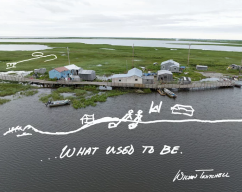永冻层渐融危机:北极圈村庄面临坍塌

Twitchell and his wife, Bertha, are raising seven children in their small home in Kasigluk, a village of about 450 people in Southwest Alaska. These days, their house is sinking. One side is so sunken into the wet, marshy ground that when neighbors walk past the kitchen window, all the Twitchells can see are their knees. The Twitchells aren’t sure how much longer this house will be standing.
Like the Twitchells, families in Alaska Native communities across the state are in a race against time. Human-caused climate change is warming the region and melting the frozen mixture of ice, rock and dirt that forms the base for much of the landscape. That’s weakening everything from homes and schools to water and sanitation (公共卫生) systems. Alaska Native communities have been raising the alarm for years, warning that melting permafrost (永久冻土) and erosion (侵蚀) threaten their ability to stay on the land where their families have lived for generations. Now, officials say, the issue has reached a breaking point.
The simplest solution for the Twitchell family would be to move across the river. Nearly everyone in Kasigluk agrees that the best solution is for the families to move across the river to Akula. The question is how to pay for it — especially in a village, and region, where much of the community lives below the poverty line.
For most people, moving across the river would mean building a new house. Like much of rural Alaska, Kasigluk has a severe housing shortage, and most of the threatened homes have deteriorated too much to relocate. But building in rural Alaska is extremely expensive. There are no roads connecting Kasigluk to the nearest town. The community relies on planes and snowmobiles to travel in winter, or boats in summer. Most supplies and construction crews have to come by plane or boat.
The traditional council has spent years working on a way to get residents to the safer side of the river. But they’re constantly struggling with the complicated process, running up against a lack of funds and dealing with red tape (繁文缛节). “It’s pretty stressful,” official Nickefer Kassel said. “At times it feels like everything is in a stall. It’s frustrating.”
原创编写 版权所有 侵权必究! 每日更新 个性化阅读 英语飙升!